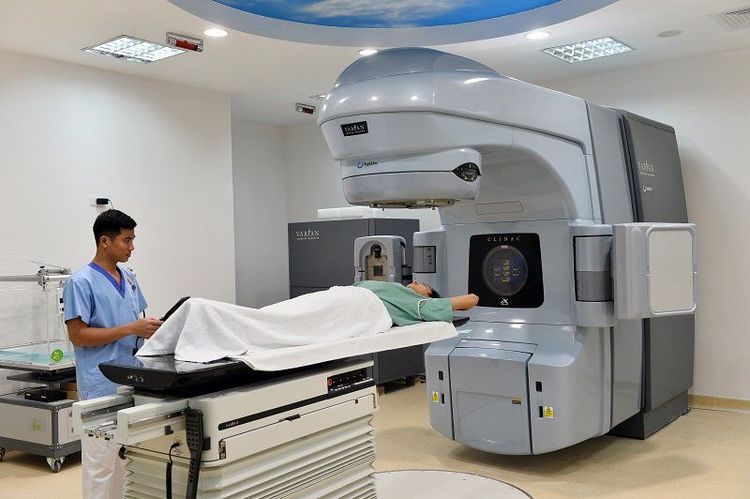This is an automatically translated article.
Most patients are very scared when the doctor announces that “You have cancer”. However, after this initial shock, it is important to calm down, listen to the diagnosis and advice from the doctor to prepare yourself and a strong mentality against this terrible disease. .1. Learn about diagnosis
Cancer is a group of more than 100 diseases. It is important to understand the specific type of cancer or cancer-related syndrome you have been diagnosed with by your doctor. To understand his diagnosis, the patient needs to go through the necessary tests. Thereby, helping to determine the specific type of cancer you have, the stage of the tumor and whether it has metastasized or not. Once the disease is identified, treatment options are presented.
When you first receive information that you have cancer, you may have a shock reaction and may not be able to absorb the information that the doctor mentions later. Or unfamiliar medical language can be confusing. Ask your doctor for any medical terminology you don't understand. Because only knowing all the information about the disease makes it easier to determine the direction and make informed decisions in the process of cancer treatment.
2. Learn about cancer treatments
Should understand the treatment methods to make the right choice for you. Here are some popular cancer treatment methods today:
Surgery Considered one of the important methods in the treatment of cancer, including palliative surgery and radical surgery . Depending on the stage of the disease, the doctor will ask the patient to perform one of the two types of surgery above. Surgery can be used in combination with other treatments such as radiation, chemotherapy, immunotherapy, and endocrine therapy. However, performing surgery also leaves some complications such as loss of physiological function of some parts of the body, even threatening the patient's life. Therefore, consideration should be given when choosing surgical treatment to avoid damage to other vital organs. Radiation treatment After surgery, this is the second solution in cancer treatment. There are two types of radiation therapy: brachytherapy and external radiation.

Điều trị tia xạ
Radiation therapy has the potential to cure more than 50% of newly diagnosed cancers Chemotherapy applies to metastatic cancer cases. When using anti-cancer chemicals, it is possible to stop the growth of cancer cells. However, the chemicals used are all cytotoxic, so it should be based on factors such as the stage of the disease, the type of disease, the age of the patient, previous treatments and the health status of the patient. patients to make treatment decisions. Some other treatments Targeted cancer treatment: Using drugs to stop the growth of cancer cells Endocrine therapy Immunotherapy
3. Find support
3.1 Emotional support A cancer diagnosis can make people feel anxious, sad, hopeless, depressed about everything, and scared about death. In addition, cancer can affect relationships in family, friends, and caregivers. Patients often feel anxious about the symptoms of the disease, fear the disease will recur and see that the disease is affecting and disrupting their lives.
However, when cancer knocks on the door does not mean that life has become hopeless. There are many ways to help you manage your emotions and strengthen your mental health to get through the illness:
Ask your doctor what the diagnosis means for you and what the future holds. When you understand the disease, it will help you to stabilize your mind and no longer feel afraid. Share your illness and feelings with family and friends; because they can help you feel stronger and support you through your illness. To cope with the turmoil in your life, build a new perspective on yourself, think about the things that are important to you, and enjoy the rest of your time happily with your family 3.2 Financial assistance The cost of cancer care can be high and burdensome for some people. Immediately after your diagnosis, start talking openly with your health care team about the cost of care. Knowing your expenses before you start treatment can help you manage the financial impact of your cancer.
4. Learn about palliative care for cancer patients
Patients with cancer not only suffer from physical pain but also suffer severe psychological trauma. Therefore, palliative care therapies play an extremely important role in the treatment of cancer. This therapy focuses primarily on improving the quality of life of patients and their families, reducing suffering, and preventing and reducing the burden they are carrying.
Điều trị bệnh nhân tại Vinmec
Efforts to accompany Cancer patients in Vietnam, Vinmec Times City International Hospital has invested in building a modern Cancer - Radiation Therapy Center according to international standards, using an approach model multi-specialty in diagnosis, selection of appropriate treatment regimens for each patient, contributing to comprehensive patient care.
Team of highly qualified and experienced doctors. Comprehensive professional cooperation with domestic and international hospitals: Singapore, Japan, USA, .. Comprehensive treatment and care, multi-specialty coordination towards individualizing each patient. There is a full range of main cancer treatment methods: surgery, radiation therapy, chemotherapy, stem cell transplantation, immune enhancement, palliative care... All patients are informed before treatment. through a professional council, with the participation of leading experts: Surgery, Internal Oncology, Pathology, Diagnostic Imaging, Radiotherapy... The treatment regimens comply with practice guidelines. international clinical practice, as well as reference to regional and domestic oncology hospitals. Treatment drugs provided by the Pharmacy Department are always of the best quality.
Please dial HOTLINE for more information or register for an appointment HERE. Download MyVinmec app to make appointments faster and to manage your bookings easily.
Article referenced source: Cancer.net












